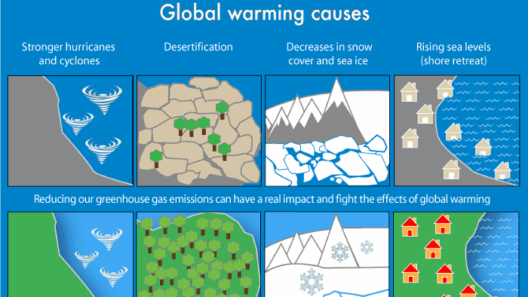Climate change is an ever-looming specter that casts a long shadow over our planet. Each of us can wield a symbolic sword against this specter, wielded not in combat but in conscious action. The question remains, what simple yet potent actions can we take to mitigate the effects of global warming? Let’s traverse this vital landscape together.
It’s important to understand that individual attempts to combat climate change may seem like casting a pebble into a vast ocean. But remember, each pebble creates ripples that ripple outward, influencing the tides of change. Here, we explore practical actions that contribute significantly to this global challenge.
In the face of global warming, it is imperative to transform our personal habits into a synergistic force for good. We can address energy consumption, food choices, transportation, and waste management—these four cornerstones of daily life provide numerous opportunities to pivot toward sustainability.
Let’s delve deeper into these domains.
Redefining Energy Consumption
The modern world thrives on energy, but our insatiable thirst for it generates a considerable amount of greenhouse gases. Simple actions like switching to energy-efficient appliances herald a silent revolution in our homes and workplaces. These devices consume less power and, in turn, diminish our carbon footprints, serving as a quiet yet powerful ally in the battle against climate change.
Home automation is another ally. By investing in smart thermostats, one can regulate heating and cooling systems more efficiently, adjusting temperatures based on actual need rather than mere habit. Such control can lead to significant reductions in energy use—a bastion of sustainability—one degree at a time.
Moreover, consider the allure of renewable energy sources. Opting for solar panels is akin to donning the armor of a crusader, protecting our atmosphere from the relentless advance of carbon emissions. By harnessing the sun, we can generate clean energy while simultaneously reducing reliance on fossil fuels. Even if solar panels are not feasible, advocating for renewable energy options in your community can lead to substantial transformations.
Food Choices: Nourishing the Planet
The consumption choices we make daily are not just dietary decisions; they are resonant declarations about our commitment to the environment. The concept of a plant-based diet has gained traction, and for good reason. Meat production is one of the leading contributors to greenhouse gas emissions. By embracing a more plant-centric menu, we become both nurturers of our health and defenders of the Earth.
Local sourcing of food is another compelling avenue. Farmers’ markets often brim with seasonal produce, allowing us to savor the bounty of nature while minimizing the carbon emissions associated with transportation. Choosing organic and sustainable produce can further enhance the ecological balance, ensuring that our consumption harmonizes with the Earth’s natural rhythms.
Reducing food waste is an often-overlooked aspect of tackling climate change. When edible food gets discarded, it contributes to methane emissions as waste decomposes in landfills. Commit to meal planning, utilize leftovers creatively, and compost what cannot be used—these actions weave a tapestry of responsibility that reflects our awareness and respect for resources.
Transportation: The Journey Toward Sustainability
Transportation is a double-edged sword; it connects us yet often fuels emissions that stifle the atmosphere. The shift toward sustainable transportation methods can manifest in both personal and communal settings. For instance, biking or walking short distances not only nourishes the body but also reduces the carbon footprint astutely.
Public transportation serves as a communal network where individual emissions are collectively minimized. Embracing buses, subways, or trains transforms commuting from a solitary act into a shared journey, fostering a sense of community while decreasing the volume of vehicles on the road.
Carpooling is another compelling strategy. By sharing rides, we can slash the number of vehicles required, creating a cascading effect that echoes throughout the air we breathe. Consider also the potential of electric vehicles. While a more significant investment, transitioning to an electric car is akin to propelling oneself into the future, championing clean and sustainable innovation.
Waste Management: The Circle of Life
The culture of consumerism often leads to mountains of waste, but within us lies the capacity to reshape this trajectory. The practice of reducing, reusing, and recycling offers a pathway to limit the amounts of waste destined for landfills, where it contributes to deleterious greenhouse gases.
By supporting companies that adopt sustainable packaging, we amplify our voices for change at a corporate level. Furthermore, understanding the composting process not only enriches soil but also transforms waste into a treasure trove of nutrients, closing the loop on our consumption.
Lastly, mindful consumption should be the guiding mantra. By questioning the necessity of each purchase, we pave the way for a more conscious approach that prioritizes ethical and sustainable products over mere convenience.
In conclusion, the journey of combating climate change begins with small, deliberate steps infused with intention. By redefining our energy use, food choices, transportation methods, and waste management practices, each individual can become a vital cog in the machinery of environmental stewardship. As we cast our pebbles into the ocean of collective responsibility, we can create waves of change that ripple across our beloved planet. It’s time to act, for the future hinges upon our ability to adapt, innovate, and endure.







